What Payment Processors does Shopify use?
In the context that security has been a top priority, the payment processor has now become the optimal choice for online payment transactions thanks to its superior utilities compared to other payment methods. Hence, this writing will take you through all the payment processors that Shopify use and help you choose the most suitable one for your online store.
The choice of integrating payment processor is not only a safe and effective solution but also helps to affirm the reputation of the business itself. In particular, to ensure you have a good conversion rate, deciding to pick a great payment processor is something you won’t want to take lightly. Therefore, I’ve prepared for you an informative post about Shopify payment processors to support you to choose the best one.
What is a Payment Processor?
Firstly, I would like to talk about what is a payment processor to clarify it. A payment processor is a company (usually a third party) appointed by the seller to process transactions from various channels such as credit and debit cards for banks requested by the seller. The payment processor will check the details received by forwarding them to the card-issuing bank for verification and also implement a variety of fraud protection measures.
The payment processor will receive transaction information from the payment gateway. It will then authenticate and execute that information. The final step is that the payment processor will deposit the money into the merchant account. If the transaction is successful, it will also notify the payment gateway.
The payment processor is a very important component for any e-commerce application designed to allow payments from customers. Therefore, it needs to be carefully considered and selected. Any omission may affect sales and transactions of the seller and negatively affect user experience for customers or buyers. Let take a view of the following section to have more useful information about what Top 9 Payment Processor Shopify uses.
Top 9 Payment Processor Shopify use
1. Shopify Payment
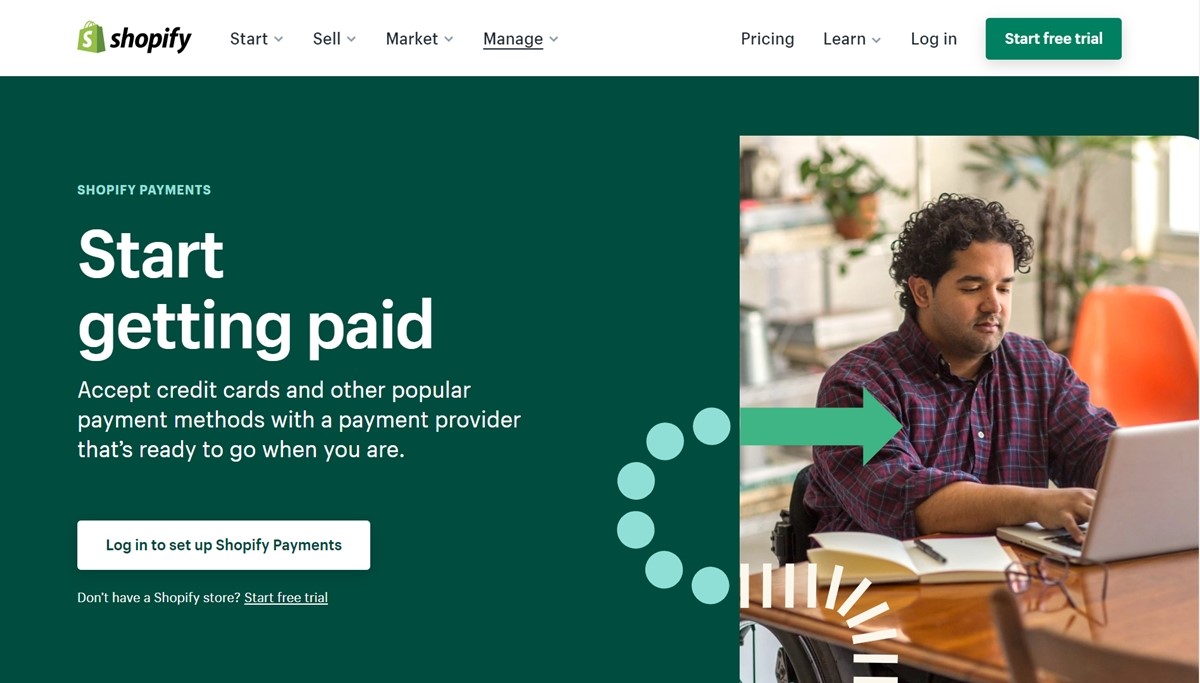
If you are using Shopify for business, it would be great to consider their payment method Shopify Payment powered by Stripe. This is one of the very famous payment gateways. The problem you will be charged 2% for each successful order when paying through the 3rd party bar gateway. This is a pretty big fee, compared to other payment gateways. Unless you sign up for the $ 299 / month plan, the fee will be only 0.5%.
Shopify Payments will have a fixed fee for your credit card monthly.
| SHOPIFY PAYMENTS | Shopify Basic | Shopify | Advanced Shopify |
|---|---|---|---|
| Online credit card rates | 2.9% + 30cent | 2.6% + 30cent | 2.4% + 30cent |
| In-person credit card rates | 2.7% + 0cent | 2.5% + 0cent | 2.4% + 0cent |
| Additional fees using all payment providers other than Shopify Payments | 2.0% | 1.0% | 0.5% |
2. PayPal
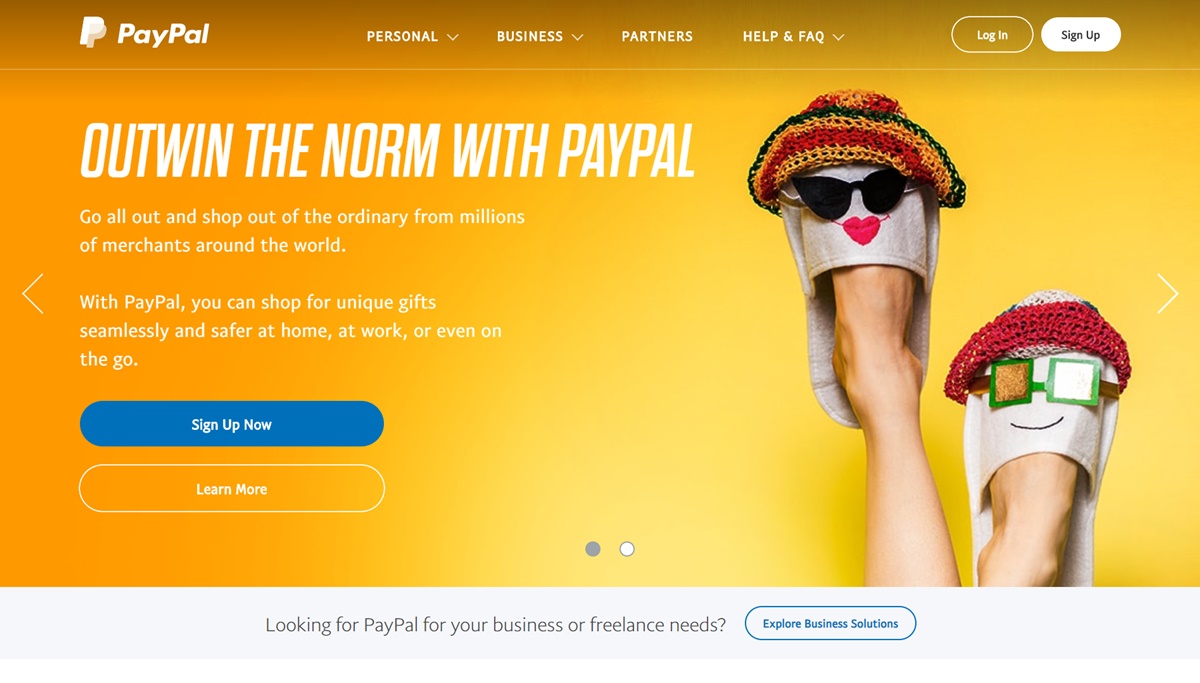
PayPal is the world’s largest online payment gateway and the most popular currency in PayPal is the USD. Paypal makes buying, paying and receiving money from one country to another convenient and increasingly popular worldwide. According to statistics, nearly 90% of online stores on Shopify use PayPal as the main payment gateway for customers around the world.
Here are the specific costs when you choose to use PayPal:
- 1.9% + 20p per transaction for sales of up to £ 55,000 per month.
- 3.4% of all transactions + 20p for sales less than £ 1,500 per month.
Paypal is extremely safe in transferring & receiving your money. Therefore, it is believed to be an ideal option for you if transaction fees are not a concern.
3. 2Checkout

2Checkout is also a long-standing name in the US. This payment gateway is available in 196 countries, accepting credit cards, Paypal, and debit cards. The payment gateway supports 15 languages and 26 different currencies.
-
No monthly service charge and cancellation fee (Refund)
-
Transaction costs are quite low, you just need to pay:
-
In the United States: 2.9% + $ 0.30 (domestic)
-
International: 3.9% + $ 0.30 (Business in the United States receives international money). Transactions from other countries 5.5% + $ 0.45
-
2Checkout policy also states: They may charge higher than the above fee if your product is on the list of banned products or your account has a transactional reputation.
In addition, you are also free to create and maintain ports monthly. Consumers can use 2Checkout at any major online fashion store. 2Checkout has strong security options with CVV checking and address verification. We can see 2Checkout is quite economical to experience.
4. Alipay Global

Alipay is a third-party China e-wallet, was launched in 2004 by Jack Ma and the Alibaba Group. When using the online payment service of Alipay, consumers do not have to spend too much effort and time with cumbersome procedures like other types but experience how to pay extremely quickly and smoothly.
Alipay performs the main task of guaranteeing payments in online transactions. When an online transaction order is created, Alipay will play the role of a third party to act as an intermediary to ensure the two parties take the transaction seriously. The biggest difference from PayPal is that Alipay only charges transactions while PayPal also charges for foreign exchange.
In the transaction, after completing the negotiation process, the buyer will make payment and at this time Alipay receives money from the buyer, freeze the payment and then notify the party. Selling goods and request the sellers to deliver goods to the buyer’s address as committed. After the buyer receives the goods and completes the check, sends a confirmation to Alipay to remove the payment tape, the seller will receive the money and the transaction is completed.
5. WorldPay
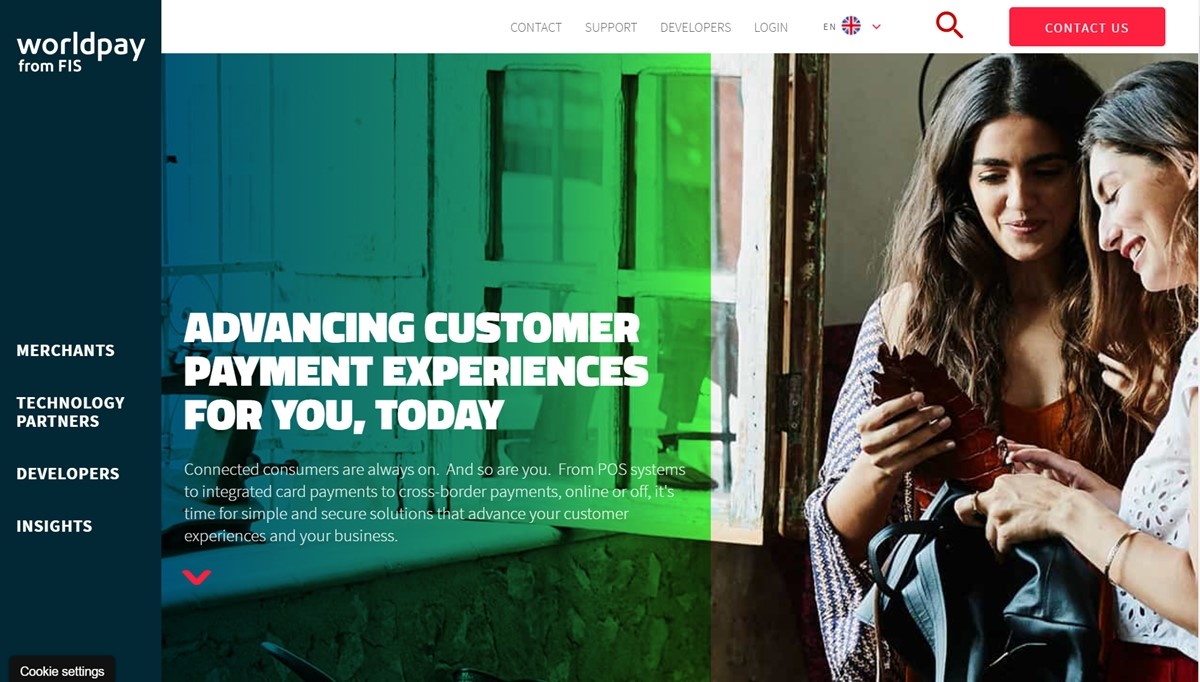
As the name implies, WorldPay is flexible in several different countries. This payment gateway allows you to take advantage of domestic payment methods such as electronics, Maestro and Laser. Also, you can use different languages and different currencies with WorldPay. This payment gateway tries to support effectively for businesses around the globe.
WorldPay prices are being calculated in pounds (Great Britain Pounds). If you are in a country outside of England, you may have to convert currencies. Here are some of the fees you may incur when you use the WorldPay payment gateway:
- As you go, you will need to pay about £ 25 set up fee, 10p per transaction.
- Monthly fixed fee: from £ 49.99 including transactions to the specified threshold.
- The standard charge will be a monthly fee of £ 19.95, 10p per transaction. Not to mention the ratio of debits and credit transactions.
6. Stripe
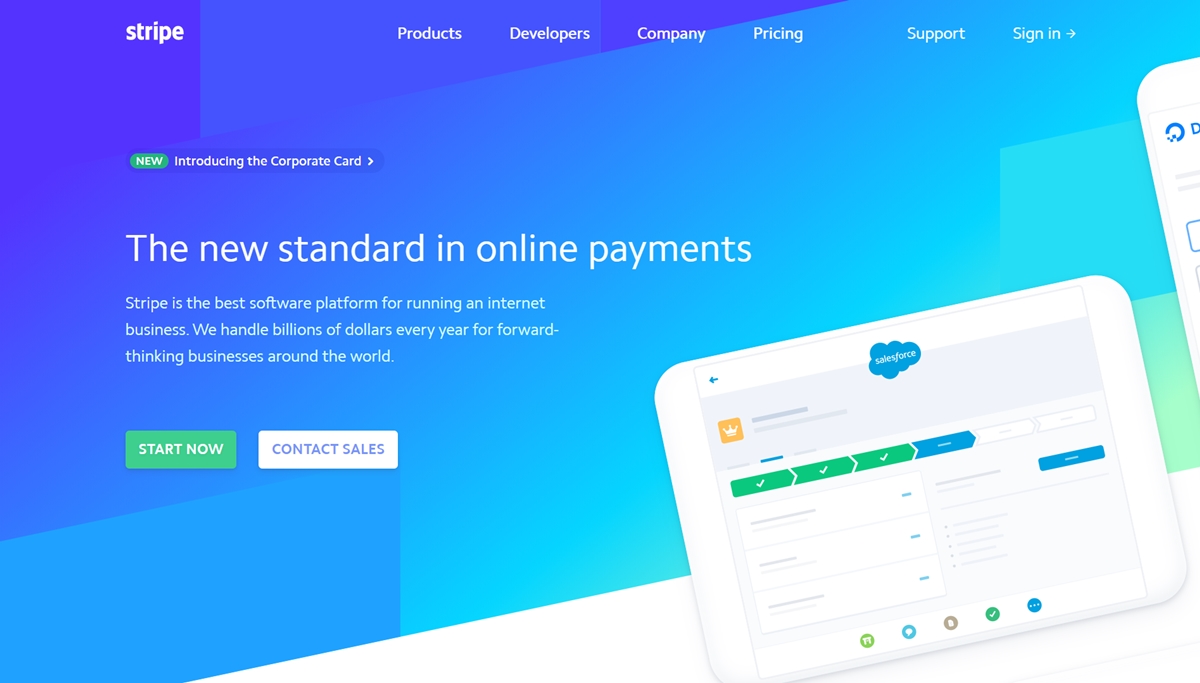
Stripe is a US payment gateway and was present in 26 countries in 2018. Stripe has advantages such as advanced payment and security technology, accurate exchange rate prediction, and detailed reporting tools. If you’re an international business, this is a great payment gateway. Customers can pay directly via the card without having to register for an account. You can easily register in supported countries. Also, Stripe also supports multiple currencies. But nothing is perfect, so there are still some disadvantages such as not allowing registration in many countries and not suitable for restricted industries and products.
One of the best things about Stripe is its obvious pricing. It is divided into two types of transactions, which are credit card transactions (Credit payment) and ACH (Automated Clearing House). Here’s how Stripe charges:
-
Payment card: 2.9% + $ 0.30
-
ACH: 0.8% (limited to $ 5)
-
No registration fees, no monthly fees
-
Receive money within 1 to 2 days for US accounts. (except where there is doubt in the source and report the risk)
-
The chargeback fee you pay is $ 15 per dispute
7. Klarna
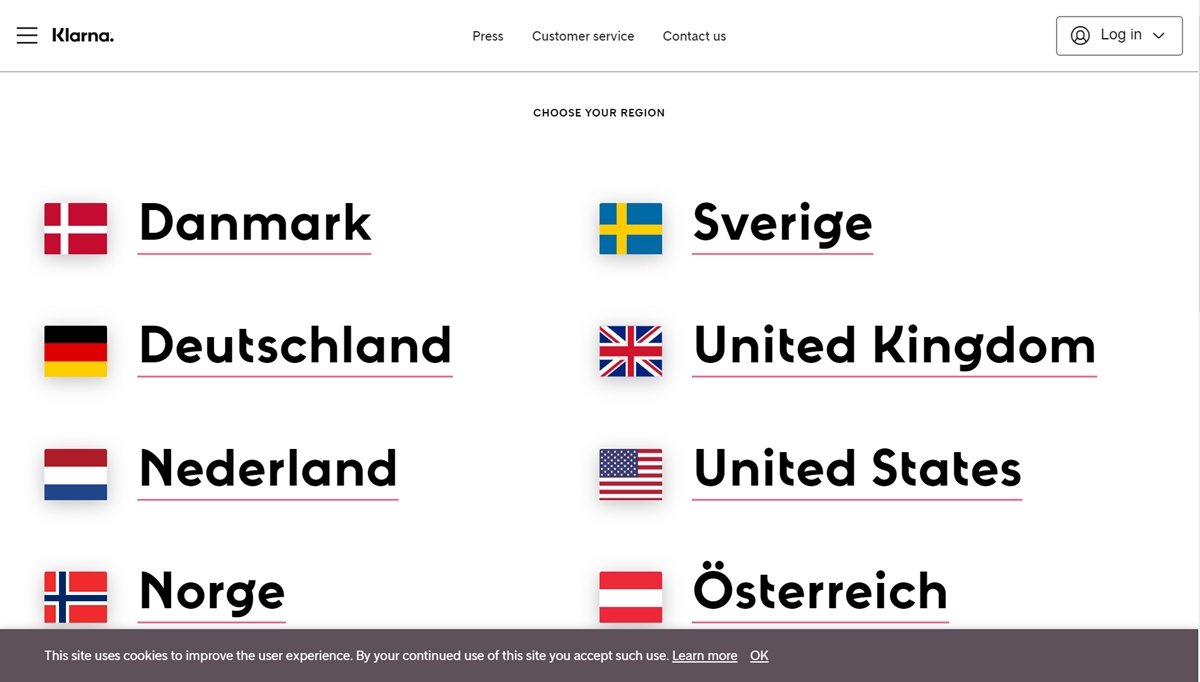
Swedish startup Klarna is one of the few financial technology companies to provide customers with “buy first, pay later” services. In simple terms, when customers come to your shopping page, they can pay immediately by card or PayPal or they can pay later with Klarna. With Klarna, they can complete orders without paying sellers instantly. Instead, they pay Klarna up to 30 days after the product is delivered.
Users also do not have to register or create an account. Instead, Klarna charges transaction fees to retailers and takes a percentage of orders. In return, Klarna claims to be able to increase the number of orders for retailers. After combining with Gymshark this year, the retailer’s average order value increased by 33%.
Klarna has a fairly simple way of charging. Transaction fees will decrease with increasing sales. Specifically, from 2.49%, down to 2.19% then 1.99% per transaction as sales increase. Interestingly, you will not have to worry about any risks as Klarna will bear it all.
However, Klarna is operated quite securely. They said less than 1% of customers cannot pay the bill.
8. Amazon

Amazon Pay is the new service of online giant Amazon. Amazon has an extremely large number of customers and they have all signed up for an Amazon account. Only with an Amazon account can they be easily used to purchase and pay when making purchases on affiliate websites that use Amazon Pay. Payment is made quickly and safely, so it is gradually being used by online store owners as a new payment method for its customers.
For an online shop, when integrating the Amazon Pay payment method, it will be a guarantee for prestige because this is a payment method mediated by Amazon, so customers are very comfortable when using. The method of calculating transaction fees is as follows:
-
3.4% + 20p if the store’s sales are less than £ 1,500 per month.
-
1.4% + 20p if the store’s sales are more than £ 55,000 per month.
Amazon Pay is the new service of online giant Amazon. Amazon has an extremely large number of customers and they have all signed up for an Amazon account. Only with an Amazon account can they be easily used to purchase and pay when making purchases on affiliate websites that use Amazon Pay. Payment is made quickly and safely, so it is gradually being used by online store owners as a new payment method for its customers.
For an online shop, when integrating the Amazon Pay payment method, it will be a guarantee for prestige because this is a payment method mediated by Amazon so customers are very comfortable when using. The method of calculating transaction fees is as follows:
-
3.4% + 20p if the store’s sales are less than £ 1,500 per month.
-
1.4% + 20p if the store’s sales are more than £ 55,000 per month.
Amazon Pay is simple to use, easy to manipulate with all customers. Using Amazon’s payment method on your website ensures credibility, increasing the trust of customers when they visit your electronics store or sales page and leading to increased sales.
9. Sage Pay
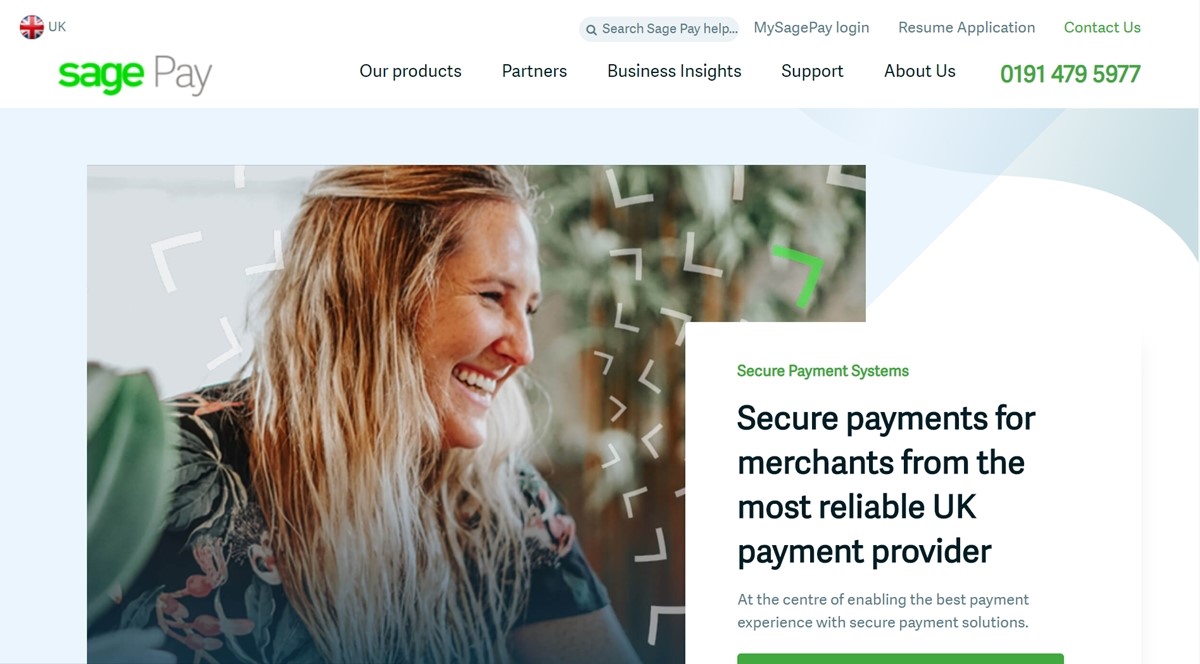
Sage Pay is a trusted brand in the UK. It is one of the most intelligent and optimal Shopify payment platforms. It allows you to directly approach your customers and bring optimal utilities to increase profits, affirm the brand reputation in the market. In particular, Sage Pay brings a highly secure solution, minimizing the risks during the payment process. Furthermore, you can receive lots of help from thousands of Sage Pay’s partners to build a wonderful online business. Sage Pay’s transaction costs will be calculated as follows:
- With Flex Plan, it will cost £ 20.90 for 350 transactions free then £ 0.12 per transaction.
- With Plus Plan, you will need to pay £ 45.00 for 350 transactions free then £ 0.10 per transaction.
- With Corporate Plan, you are charged with bespoke pricing for 3,000 + transactions.
The Best Payment Processors in some major countries
Of the criteria to choose the most reasonable and ideal payment processor, your position is an extremely important one. Because when you use a payment processor popular in your country, it will bring convenience to your customers so they can pay online easily and regularly. Your client’s experience will be improved a lot. In particular, this will help you increase your number of customers quickly and significantly. Therefore, let click on our article about The Best Payment Processor in some major countries to choose the one that best suits where you live.
Below are some small tips to help you make a wise decision: You will have a great payment processor if you have carefully considered factors such as:
- A service fee, the foreign currency conversion fee is not too high or suitable for your budget.
- Registration requirements are not too complicated or require no registration. The payment processor accepts credit cards, debit cards, and Paypal.
- Multi-currency support and easily expands business globally.
- Do not ask customers to fill out irrelevant information.
Summary:
Online payment is an indispensable trend in the development of technology. Online payment is convenient, fast and less risky, so it is gaining more and more users’ trust. Therefore payment processors were also born to meet market demand.
This post gives you lots of helpful information about the payment processors Shopify uses. Depending on the processor, there will be features and incentives suitable for many customer needs of small, medium, and large businesses. I hope you get the information you need through this post and choose the best payment processor for your store.
Related Posts:





